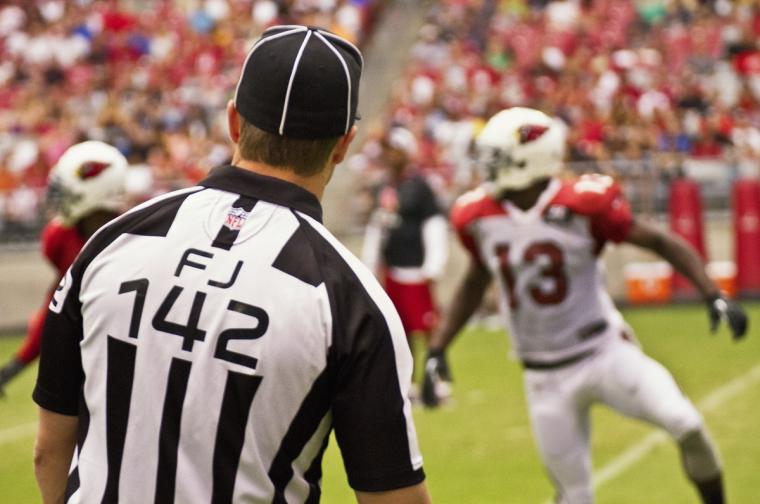
The NFL sees London. The NFL sees France. The NFL sees… Mexico, Spain, Brazil and everything else, apparently, as it searches for world domination.
Last week, news broke that the league is reportedly eyeing more destinations in Europe for games in future seasons. According to the Associated Press, the league will host five games outside the USA this season (three in London followed by two in Germany) and has targeted Spain and France as the next European destinations as it aggressively tries to expand its international footprint.
“We’re certainly looking at the viability of places such as Spain and France in Europe,” Brett Gosper, NFL Head of Europe and UK, told The Associated Press in an interview. “That’s why we’re always firsthand looking at stadia and cities if they align with our strategic objectives in those markets.”
ESPN reporters noted: “NFL officials have made site visits to Rio de Janeiro and Sao Paulo in Brazil and Madrid in Spain where they were "building relationships, looking at the stadia there, looking at the operations partners, the infrastructure," Peter O'Reilly, the NFL's executive vice president for club business, and international and league events, said in a recent media call.
Twenty-one teams are participating in the NFL's global markets program in 2023 across 14 countries. The league has expressed interest in bringing games to several of those markets and hasn't ruled out putting a franchise overseas in the future. Under the global markets program, the Chicago Bears and Miami Dolphins have commercial rights in Spain. The Dolphins are the only team with rights in Brazil.”
“I do see us playing in more markets very soon, as early as next year,” the league’s commissioner Robert Goodell, told AP reporters. “We actually have three or four markets that are here this weekend and next weekend that are interested in hosting a game.”
The NFL’s history of international markets stretches back a number of years; in January 2020, Goodell said the 2020 and 2021 football seasons would include one game each in Mexico City; unfortunately, the pandemic swept that off the table and games were not rescheduled for 2023. (Blame that on the 2026 World Cup; the stadium, which will host World Cup play, is being renovated, with the expectation that it will be out of use between 12 and 18 months.) But when the time is right, Mexico will likely host; the country, according to Wikipedia, does embrace football, with the site noting it is the fourth-most-popular sport in the country.
The NFL is undoubtedly looking at other international hosts in the meantime; however, a claim in the Daily Mail that the NFL had appointed a manager in Australia and opened an office there was refuted by the league.
“At this time we do not have plans to play a game in Australia but are firmly committed to finding more ways to serve our passionate and growing fanbase in Australia and New Zealand,” NFL COO/International Damani Leech told Ben Fischer of Sports Business Journal. And currently, the closest fans Down Under can get to the NFL, short of hopping on a plane, is by streaming games.
Goodell also once stated that he thought “Toronto could be a great city for an NFL team.” The Canadian Football League hasn’t had much success in the U.S., having teams here only a few years before returning to Canada – but at least at the time, Goodell thought the NFL would have better luck in the North, according to Sports Pro Media.
“I’m from Western New York and I spent a lot of time in Canada as a young kid. I have nothing but admiration for Toronto, I think it’s a great city. It continues to evolve, it continues to grow. It certainly could be a great city for an NFL team,” Goodell said in one press conference.
 And the awareness of football, or as it is known internationally, American Football, is growing globally. One reason for the increased visibility is flag football, which was seen in the World Games in Birmingham, and which has now been confirmed as a showcase sport at the 2028 Olympics in Los Angeles.
And the awareness of football, or as it is known internationally, American Football, is growing globally. One reason for the increased visibility is flag football, which was seen in the World Games in Birmingham, and which has now been confirmed as a showcase sport at the 2028 Olympics in Los Angeles.
The NFL is putting in the work to expand the sport. But whether or not it will make the leap to hosting regular events outside the country seems to be unclear for a number of reasons. It is, after all, a hard sell since it lacks a presence in international schools. Unlike, for example, ice hockey or basketball, where players from other countries are more common, pro football players are almost exclusively from the U.S., having already made a name for themselves at the American university level prior to entering the draft. Outlasting the novelty value, ticket sales abroad will depend upon having a lasting fan base, which in turn, depends on whether audiences can identify with the players.
And, at the end of the day, the game simply isn’t a household name in other countries the way it is here. The American Football Coaches Association noted on their blog, “Germany and other countries around the world, suffice to say, do not list American football among the cornerstones of their cultural heritage.”
Because the game is not generally taught internationally unless a player seeks it out, youth athletes with field sport skills will gravitate to soccer, field hockey (a popular sport for men in other parts of the world) or rugby, opportunities for which are abundant for schoolchildren in other countries. And with all three of those being fixed medal sports in the Olympics, they receive more global attention and fall into the category of aspirational sports for children outside the U.S.
Additionally, the philosophy of the game has come as an affront to some markets. AP noted, “American football has a small following in Japan [where it is still regarded as a niche sport.] The violent tackle with intent to injure — against the rules wherever the game is played — has shocked many Japanese and raised questions about the game’s future.”
An article in Wired explained in great length some of the challenges facing the NFL. Among the problems, noted Matt Bowers, a professor of sports management at the University of Texas at Austin, said one of the greatest challenges was establishing a level playing field. “Arguably, one of the reasons driving the NFL’s success here at home has been the competitive parity of the league,” says Bowers. “I think you can make an argument that playing in London, or even just traveling to and from London, presents a real competitive disadvantage to the teams that are doing it.”
In other words, a once-a-season game outside of North America is doable, but establishing teams in other countries that would necessitate regular travelling for games back and forth across the Atlantic (prior to traveling across the country, for those in the Midwest and West) would be grueling. One of the objections raised was the extreme time change. From the East Coast to England, the time change is significant (five hours) but moving westward in the U.S., teams are dealing with up to an eight-hour difference, on top of a long flight. “When you have elite players who have strict nutritional needs and a team of people monitoring their sleep, food intake, and exercise, and then you throw in these travel and jet lag issues, I wonder how the NFL Players Association would react to that,” noted Bowers.
Other opponents cite a second significant time-related problem; in order for the game to kick off at a good time in the U.K., U.S. viewers had to tune in starting at 9:30 a.m. (EST). Ouch. (The idea of a Super Bowl being hosted outside the continental U.S. has also been floated but is largely considered unfeasible for the same reason.)
While it’s easy to say that many other athletes in professional sports suffer from jetlag because of international travel (professional tennis and Formula One are two examples), it’s a different scenario. All those athletes are on the same tours so everyone is moving at the same time and can be seen as being equally disadvantaged. If one team’s home advantage is that significant, it can be seen as an undue hardship for other teams.
The Financial Realities of an International Team: It’s unlikely that a team based in England would be a desirable landing place for American athletes. Wired notes, “How many players (or teams) would realistically want to move to London, where the cost of living (as well as the tax rate) is pretty much guaranteed to be significantly higher? Would a big-name free agent ever agree to go there without the London team doubling the next best offer?”
Adding Teams: The Wired article also noted, “If you want to truly expand the league and create new teams, you’d have to fully commit to adding at least four more to keep league equilibrium. After 32, 36 is the next number that can be divided into six divisions of six teams each.”
Establishing a new team is a tremendous effort and an enormous investment. Adding four teams, therefore, is highly unlikely. Moving an existing NFL team away from its city is a possibility but choosing the team to move is a decision fraught with problems.
There really is not a football culture abroad, at least football as the USA knows it. After all, in the U.K., football means soccer. Rugby is popular too. But American football simply doesn’t enjoy a high profile in the international culture; children don’t play it in schoolyards or aspire to play it in college. Friday night lights aren’t a thing in England (or many other places outside of the U.S. and Canada). It’s not likely that the presence of one pro football team would generate sufficient interest to change any of that. (And the attention being paid to the dangers of concussions is enough to have parents to shooing their children into other sports).
NFL's History in International Football Has Not Been a Success Story
The World League of American Football was formed by the NFL in 1989. It played under that name (with breaks when it did not run in 1993 and 1994) until 1998 when it was rebranded as the NFL Europe League or NFL Europe, a name that lasted until 2006.
In 2007, the league officially changed its name to NFL Europa. Unfortunately, 2007 also turned out to be the last year for the league. According to the Washington Post, Goodell closed the league, stating that it was time to develop a new international strategy, and that folding NFL Europa was the "best business decision." (The league reportedly was losing about $30 million a season at the time, so he was right on that point).
But this time, the NFL’s expansion plans have a better chance. After all, the world has changed since 2007. More fans around the world can partake of each other’s sports today, thanks to smartphones, live streams and social media, than they ever could back in the days of NFL Europa. And with the advent of flag football in the Olympics (at least in 2028), awareness of the sport is growing. And between that and the promising attention being paid to international football games right now, it may be a concept whose time has come... again.

